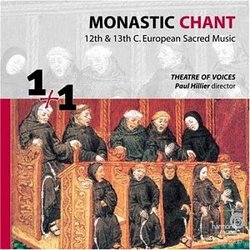| All Artists: Paul Hillier, Aquitanian Repertory Anonymous, Gregorian Chant, Medieval Hungarian Polyphony Anonymous, Albertus Parisiensis, Philippe Le Chancelier, Adam of St. Victor, Leonin, Perotin, Italian Anonymous, Codex Bamberg Anonymous, Montpellier MS Anonymous, Codex Faenza Anonymous, Guillaume de Machaut, BNF Collection de Picardie, Ivrea Codex Anonymous, Bury St. Edmund's Manuscript Anonymous, English Anonymous, Johannes Ciconia Title: Monastic Chant: 12th & 13th C. European Sacred Music Members Wishing: 0 Total Copies: 0 Label: Harmonia Mundi Fr. Original Release Date: 1/1/2000 Re-Release Date: 11/11/2003 Album Type: Import Genres: Special Interest, Pop, Classical Styles: Vocal Pop, Opera & Classical Vocal, Historical Periods, Early Music Number of Discs: 2 SwapaCD Credits: 2 UPC: 093046735623 |
Search - Paul Hillier, Aquitanian Repertory Anonymous, Gregorian Chant :: Monastic Chant: 12th & 13th C. European Sacred Music
 | Paul Hillier, Aquitanian Repertory Anonymous, Gregorian Chant Monastic Chant: 12th & 13th C. European Sacred Music Genres: Special Interest, Pop, Classical |
Larger Image |
CD Details |
CD ReviewsOutstanding medieval music compilation Maddy Evil | London, UK | 02/11/2010 (5 out of 5 stars) "This 2-CD compilation brings together 2 previous releases by the Theatre of Voices under the direction of Paul Hillier ('The Age of Cathedrals' [HMU 907157] and 'Hoquetus' [HMU 907185]). The new title is somewhat misleading - most of the music is actually polyphonic (even if many of the pieces are indeed based on chant), much of it secular (particularly on the second CD), and lastly, it also encompasses works from the 14th and even the 15th centuries (contrary to the sub-heading which would suggest otherwise). Yet in spite of this minor mishap, however, it must be said that this compilation is simply outstanding: indeed, it is quite possibly the finest introduction to medieval music currently available.
Firstly, the range of pieces presented is staggering: it includes virtually all of the most important composers before 1400 (Leonin, Perotin, Adam de la Halle, Machaut, Ciconia...etc), as well as many of most significant extant sources of medieval music (Worcester Fragments, the Codex Calixtinus, the Montpellier Codex, the Rossi Codex...etc). The stylistic range of included works is equally quantum, featuring (amongst others) melismatic organum, conducti, motets of the Notre-Dame school, a ballata, a caccia, an isorhythmic motet...etc. Secondly (and perhaps most importantly), the performances are uniformly excellent, easily rivalling the best recordings of this repertoire by other 'a cappella groups' (such as the Orlando Consort, the Hilliard Ensemble and Gothic Voices): the intonation is virtually flawless, the ensemble precise and well-balanced, and the recorded sound warm without being too reverberant. If these 2 points were not already enough to recommend this excellent compilation, there is yet another. Hillier's interpretations - in contrast with so many other recordings of medieval music (particularly those featuring such a broad cross section of music) - are in accord with the most up-to-date findings of the world's leading medieval music specialists: textless lines are vocalised, there is no instrumental doubling or accompaniment, and Pythagorean tuning is adopted. Many of the performing versions were also prepared after consultation of facsimiles and musicologists' editions (such as those by Leo Treitler, Theodore Karp and Hendrik van der Werf). Lastly, the compilation includes 4 pieces from the Faenza Codex, performed, not (as is so often the case) by harp, vielles, recorders or even clavicytherium, but actually on an organ - the instrument for which this music was almost certainly envisaged. As a side point, it would have been interesting if Hillier and his singers, in interpreting some of the earlier repertoire presented on CD1 (organa, conducti, etc), had attempted to adopt some of the ornaments which are discussed by so many medieval theorists (Walter Odington, Jean de Garlande, Anonymous IV...etc.) - trembles, vibrations, ornamented intonations, fioritura, etc. Lacking such ornaments, the performances of these works sound perhaps too pure and too 'Oxbridge' to convince entirely from a historical perspective (even if they are always aesthetically convincing). However, this is a tiny moan in the context of so many positive things which can be said of these recordings. In short, a 6 star release - very highly recommended!! " |
